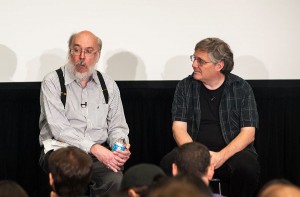Panel discusses technology in comics
The Geek Speak lecture series continued this semester at the School of Cinematic Arts on Thursday night with an event titled “The Future of Comics,” featuring a one-on-one conversation between Scott McCloud, leading comics theorist and author of the “Comic Trilogy,” and Henry Jenkins, USC Provost’s Professor of Communication, Journalism, Cinematic Arts and Education.

Geek squad · USC Provost’s Professor Henry Jenkins (left) and comics theorist Scott McCloud (right) were featured speakers at Geek Speak. This event focused on comic book innovations as a result of technology. – Samuel Chang | Daily Trojan
The Geek Speak lecture panel celebrated the 15th anniversary of the second book in McCloud’s trilogy, Reinventing Comics: How Imagination and Technology Are Revolutionizing an Art Form. The event was co-sponsored by the Annenberg Innovation Lab, the Visual Studies Research Institute, the USC Interactive Media & Games Division, and the USC John C. Hench Division of Animation and Digital Arts.
“Henry wanted to create an event where the geekier among USC had an opportunity to come together and discuss things like comics and video games,” said Geoffrey Long, the technical director and a research fellow for the Annenberg Innovation Lab.
McCloud talked about the creative process that went along with writing his book. He said that comics on the web used to be black and white comic strips that loaded extremely slowly. With the open architecture of the web, McCloud became obsessed with the possibility of digital spaces and with reinventing the commerce and the shape of comics online.
Jenkins and McCloud discussed the idea of producing comics on an infinite canvas, as opposed to limiting the reading experience to a contained rectangle.
“With these comics, we should be trying to maintain a sustained narrative spell of pulling [the reader] in, eliminating distractions and creating a seamless comic experience,” McCloud said.
He believes that the ideal comic experience on the web should have simplicity and an interface with an intuitive quality of single-mode navigation.
Something that print comic books have that digital comics do not is scarcity, and that’s why physical comics are so valuable.
“Will digital comics lose their value over time? Yes. Digital comics are weird because digital comics, much like digital music, are not objects so much as they are licenses. In the same way that you license a piece of software, but you never truly own it, you’re kind of seeing the same thing with comics,” Long said.
McCloud also mentioned that his initial prediction was that comics would become a majority female industry.
“It seems to take a little while [for the gender change in the industry to begin], but one day you can wake up and realize that you’ve crossed the threshold into a new diversified comic community,” McCloud said.
He said that these gender roles shifted quickly -— with a few brilliant women creators, there was a new message sent out to female readers who would eventually go to art school and become comic writers themselves.
Long brought up the ease of access for comic book fans and those getting into comics for the first time.
“It used to be that you couldn’t go back and find the particular issue in which something important happened or a character first appeared,” Long said. “If you wanted to read that comic, you had to go find some long box in a dusty corner somewhere and track down the actual physical object. Then we moved into a period where more and more comics were being collected into trade paperbacks. Now, anybody can find virtually any comic from any point in history through these digital platforms.”
McCloud said he believes comics will continue to survive despite the popularity of film.
“I think comics will continue to be a minority form compared to the moving image. But I still think it has legs. It doesn’t have to go away. It’s just a simple idea, and all art forms that last are predicated on simple ideas,” McCloud said.
Following the one-on-one discussion, a panel of comic specialists covered topics present in McCloud’s book, Reinventing Comics, such as the evolution of comics with the incorporation of modern technology like motion, sound and interactivity. Long said that the reason for putting this group of panelists together was to think about where comics are going from the perspective of new creators, users and implementations.
The panel of respondents included Daniel Burwen of Cognito Comics, Hank Kanalz of Vertigo and DC Entertainment, Joe LeFavi of Quixotic Transmedia, Long, Patrick Chappatte, editorial cartoonist for The International New York Times and Diana Williams of Lucasfilm.
“It was really nice to see how the panelists were thinking about comics in terms of interactivity, especially now that content is migrating online,” said Rachel Victor, a sophomore majoring in neuroscience. “So it’s looking beyond how we have the very linear, physical comic format. And now when it goes online, how [does] that change how we deliver it, the form of the content, and how does it change the interactivity of the content.”

